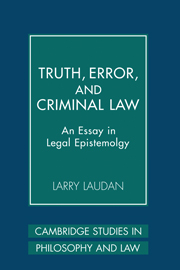Book contents
- Frontmatter
- Contents
- Preface
- Abbreviations and Acronyms Used
- 1 Thinking about Error in the Law
- PART I THE DISTRIBUTION OF ERROR
- 2 The Unraveling of Reasonable Doubt
- 3 Fixing the Standard of Proof
- 4 Innocence, the Burden of Proof, and the Puzzle of Affirmative Defenses
- PART II FLAWED RULES OF EVIDENCE AND PROCEDURE
- Index
2 - The Unraveling of Reasonable Doubt
Published online by Cambridge University Press: 05 June 2012
- Frontmatter
- Contents
- Preface
- Abbreviations and Acronyms Used
- 1 Thinking about Error in the Law
- PART I THE DISTRIBUTION OF ERROR
- 2 The Unraveling of Reasonable Doubt
- 3 Fixing the Standard of Proof
- 4 Innocence, the Burden of Proof, and the Puzzle of Affirmative Defenses
- PART II FLAWED RULES OF EVIDENCE AND PROCEDURE
- Index
Summary
It is difficult, if not impossible, to so define the term “reasonable doubt” as to satisfy a subtle and metaphysical mind, bent on the detection of some point, however attenuated, upon which to hang a criticism.
– Supreme Court of VirginiaI find it rather unsettling that we are using a formulation that we believe will become less clear the more we explain it.
– Jon Newman, Chief Judge of the U.S. Court of Appeals for the Second CircuitUpdating the Road Map
As I said in the first chapter, one of the three basic value commitments in the criminal law is to the proposition that, when errors are made, it is far better to acquit a guilty party than to convict an innocent one. In this chapter and the two following ones, we will be examining a cluster of familiar concepts and precepts, all of which give concrete expression to the importance of distributing errors in line with this sensibility: the standard of proof, the presumption of innocence, the benefit of the doubt, and the prosecutorial burden of proof. As we will see, none of these traditional principles is designed to reduce the likelihood of error in a trial. Their intended result is to distribute errors in a certain way – that is, to ensure that such errors as do occur will be predominantly false acquittals rather than false convictions.
- Type
- Chapter
- Information
- Truth, Error, and Criminal LawAn Essay in Legal Epistemology, pp. 29 - 62Publisher: Cambridge University PressPrint publication year: 2006

